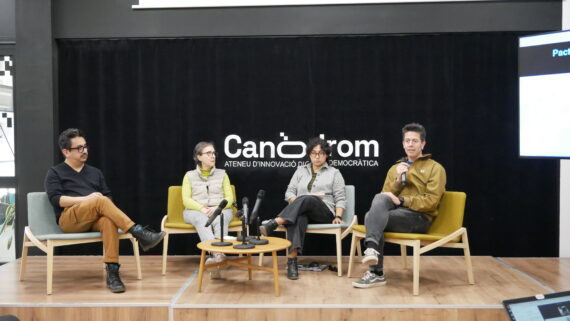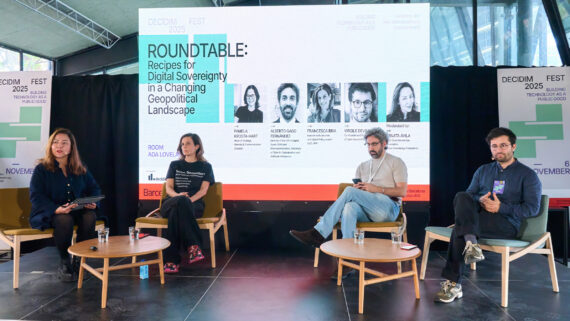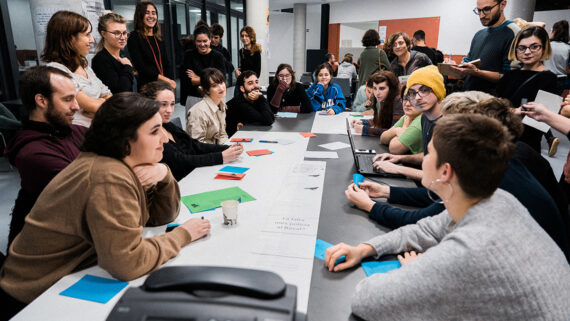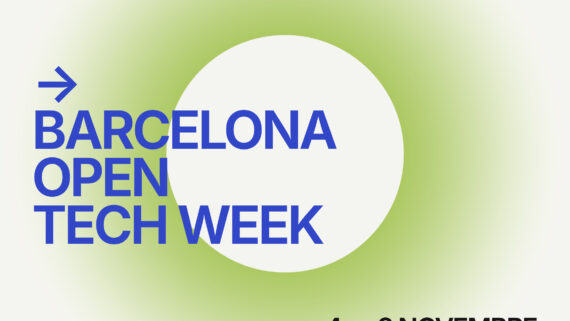The first session of the 'Growing up among screens' series provided an opportunity to reflect on the technological model underlying the current situation in schools. It also offered resources and collective actions for a more conscious, responsible, and equitable use.
The event brought together experts from different fields to address current challenges and explore ways to move towards a more responsible use of technology. The series aims to explore the challenges and reflections of digitization, focusing on its critical and digital rights approach to explore future paths.
Reimagining technology through digital democracy
The ‘Big Tech’, those dominating the technological market (Facebook (Meta), Google, Amazon, Apple, and Microsoft), find an extremely broad market niche in educational environments, which not only generates usage habits among today’s students but also creates potential consumers for tomorrow. This is indicated by the report “Digital BigTech platforms in the Catalan educational system and children’s rights” by aFFac.
These companies not only influence the habits of students but also dictate how we should relate to technologies. The massive use of their platforms in the educational environment generates a large amount of data, which can reveal existing social biases and even create new ones.
Arnau Monterde, Head of Democratic Innovation at the Barcelona City Council and responsible for Canòdrom, welcomed and presented the series Growing among screens: Education, technologies, and democracy, highlighting the importance of addressing the technological world from a democratic and citizen perspective. “It is more necessary than ever to have spaces for dialogue and debate with experts, families, and educators without falling into reductionism and to think about the digital world from all angles, putting collective intelligence at the service of solving current challenges,” he stated.
Power in schools in the hands of big tech
The debate about how schools incorporate technology is in full swing. Many teachers highlight the lack of clear guidelines from the Department of Education, which do not establish uniform criteria on which tools to use, what knowledge to provide, and what requirements teachers must meet. During the session, Sandra Gómez, a researcher at the Ferrer i Guàrdia Foundation, criticized the lack of transparency and the trend towards privatization of the current technological model, dominated by ‘Big Tech’.
This fact generates tensions between the ministry and educational agents, as some see more commercial interest than pedagogical interest in the choice of certain platforms. The consequence? A large majority of public schools in Barcelona use Google Classroom and the ‘Google for Education’ learning service, which raises concerns about the privacy of student data. “This technological model operates under rules based on consumerism, planned obsolescence, opacity in platform design, and data extractivism, contributing to deepening social inequalities and violating people’s rights,” Gomez stated. This contributes to an accumulation of power by big tech and very limited capacity for public authorities and citizenship.
Children and young people’s access to mobile devices
Recently, Catalonia has decided to introduce new regulations on the use of mobile phones in schools. This new regulation prohibits them in primary education and significantly restricts their use in high schools. However, opinions are divided on this decision. 150 teachers and experts expressed their commitment last December to the use of digital technologies in the classroom, considering that a total ban could be counterproductive to the development of students’ digital skills.
On the other hand, families and other groups, such as aFFac and the association Mobile-Free Adolescence, criticize that this new regulation is not mandatory for all educational centers. They fear that this could create inequalities among centers. Tamara Fernández, spokesperson for the Mobile-Free Adolescence association, expressed concern that children and young people have access to mobile phones at increasingly younger ages. “The social step from school to high school has normalized that young people, at 12 years old, should have a mobile phone with internet access, and families feel this pressure.” The association proposes to delay the purchase of the first phone until the age of 16, appealing to the fact that “the young person without a mobile phone in high school should not be the odd one out in the class”.
They argue that we are offering devices that are not suitable for their age and exposing them to a digital world without giving them the tools to face the risks. “We must demand that adequate support be ensured in the technological and pedagogical field, so that they make responsible use of these devices.” However, they point out that the debate goes further and that screens and the hyperconnected world we live in also affect adults.
Challenges, resources, and collective actions
When and how to introduce the use of the first mobile phone for children is a question that has been raised by the mobile phone cooperative Somos Conexión. With this objective, Mercè Botella, founding member, presented the guide for cruel and evil families. With a practical and realistic approach, it is based on a personal experience of a family with young people between 12 and 18 years old and offers practical advice on managing the introduction of the first mobile phone.
“A person cannot be the holder of a line until they are 18 years old, however, a vast majority of young people have their own mobile phone, even though they are not old enough to do so. This is mainly due to social pressure, despite existing regulations,” explained Botella.







